Film Inquiry Recommends: Underrated Neo-Noir Films
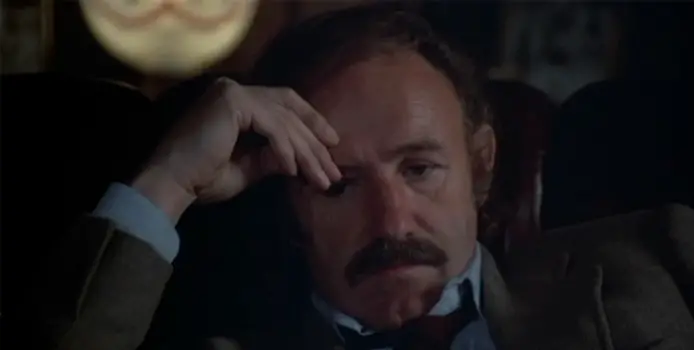
Alex is a 28 year-old West Australian who has a…
Over at our official Facebook page , we are currently posting daily Film Recommendations, with each week being a different theme. This is a collection of those recommendations! This week’s theme is Underrated Neo-Noir films. These are films which build upon the foundations of the classic noir genre and add layers of emotional depth and heightened action. These are just some great Neo-Noir films which aren’t as well known by mainstream audiences and we want to shine the spotlight on them.
1. Night Moves (1975, Arthur Penn)
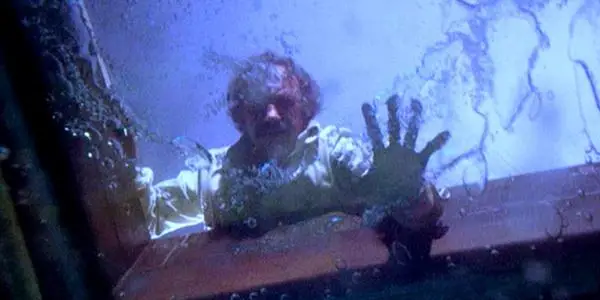
Arthur Penn made several very influential pieces of work, the biggest being Bonnie & Clyde, a film which pushed the portrayal of violence in mainstream cinema. The Left Handed Gun questioned the general perception of Pat Garrett and Billy the Kid and Night Moves changed the basic nature of the noir story, showing the clash between the old school 50’s style of noir versus today’s questionable morality tales. Gene Hackman is once again perfect as Harry Moseby, ex-footballer turned private eye, who is hired by ex-Hollywood actor Irene to find her missing daughter. What is a pretty regular, boring case turns ugly real fast once Delly (Irene’s daughter) is found.
What sets this film apart from standard neo-noir story is the character of Harry Moseby, as he’s not the usual smart, savvy detective. One of the great things about the film is that the big plot that acts as the undercurrent of the story, is something Moseby doesn’t quite get. He’s not Sherlock, he doesn’t have all the clues and he doesn’t quite know how to put them together. It’s a refreshing take on the genre and allows us to break down the story ourselves, as the story lends itself to different interpretations. The script is smart and shot in the cool old-school 70’s style that’s similar to Altman’s The Long Goodbye. Sadly not as well known as Hackman and Penn’s bigger films, it’s a film that any cinephile should check out.
2. Hickey & Boggs (1972, Robert Culp)
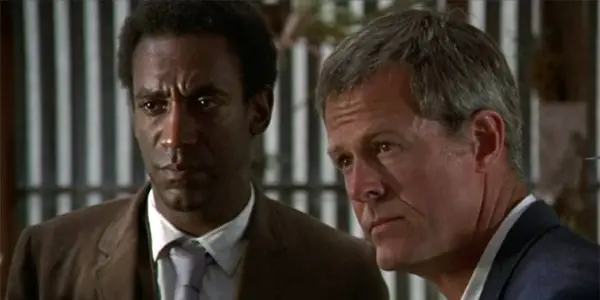
To start off with, due to the current revelations about him, it makes it quite hard to talk about Bill Cosby and his projects. To talk purely about the film, it’s quite a gritty underrated neo-noir film, a film about 2 losers trying to do some good in a bleak world. Hickey & Boggs was written by Walter Hill (one of his first cinematic efforts) and directed by main actor Robert Culp (the only film he directed). Re-united after their hit show I-Spy, Hickey & Boggs joins Bill Cosby and Robert Culp playing much different characters to those of their previous TV Show. Hickey (Cosby) is a broke divorced guy who is desperate to see his family and Culp is a loner who sleeps in his office and frequents prostitutes. Together they run a private eye agency, where they aren’t respected by the local police force but they manage to get by.
Like Night Moves, the film’s protagonists aren’t the hippest or smartest guys, which makes the film feel more realistic and quite a nice change compared to the hyper-intelligent protagonists usually seen in most crime shows and movies today. Hickey and Boggs are hired to find a missing girl and much like any noir film, the plot gets much more complicated and the bodies start to pile up. Culp directs the film well, keeping a maintained gritty atmosphere even during the film’s action packed finale, which totally works within the film as it’s setup well. This was Cosby’s only serious role he ever did and much like most comedians, does a great job of being a surly down-beaten guy clinging to the few remaining things in his life; his daughter and his job.
3. Cutter’s Way (1981, Ivan Passer)
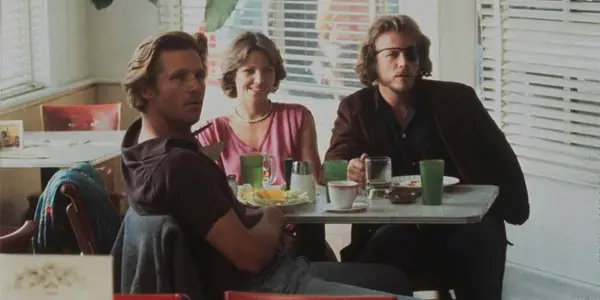
Much like Night Moves, Cutter’s Way is a neo-noir film which uses the traditional noir tropes but through the bleak post 1970’s lens, as due to Watergate and the Vietnam War, the attitudes and general morale over mainstream America had been shaped towards a more grey morality. Cutter’s Way is about Richard Bone (a younger Jeff Bridges), a broke socialite who accidentally witnesses a female body being dumped in an alleyway but chooses to do nothing about it. When he tells his Vietnam war veteran friend Cutter (John Heard, in probably his best role), Cutter decides to turn his rage from his war experiences in determining to track down who killed the girl and dumped her body. They are joined by Cutter’s strung out wife Mo (Lisa Eichron), whose investigation turns from paranoia to a full-blown conspiracy which has large shades of ambiguity to it.
This is a film not so much focused on the ‘case’, as the film has several interpretations as to wherever Cutter & Bone are actually on the right track or if they are just going after an innocent person. The film is more about the characters, these defeated broken people that are trying to focus themselves on a single goal in order to create some form of meaning within their lives and help each other out in a seemingly bleak atmosphere. The film is directed by Ivan Passer, a notable figure in the Czech New Wave movement (an early associate of the great Milos Forman), with this film being his biggest American film, which sadly bombed due to poor marketing.
4. Cold in July (2014, Jim Mickle)

Jim Mickle is one of the better up and coming American directors at the moment, between this, StakeLand, We Are What We Are and Mulberry Street, we see that Mickle has a clear understanding of genre and how to make effective, entertaining films which embrace their genre roots whilst adding new elements which make them feel refreshingly original. Cold In July was one of the best indie films of 2014 (this and Jeremy Saulnier’s great Blue Ruin), both films which tackled the way men deal with grief and how quickly our lives can change in an instant due to horrific events. Cold In July is about Richard Dane (Michael C. Hall, playing a much different role than his famous Dexter character) a simple family man who accidentally shoots a home intruder. The home intruder is the son of ex-convict Russel (Sam Shepard), who starts to slowly stalk Dane. Dane starts doing some investigating on Russel’s son and as more revelations come to play, different enemies come into play.
The plot and genre shift several times throughout the film, which may seem slightly jolting to viewers, but in terms of plot progression, is quite natural for the neo-noir genre, with new clues and plot developments changing the course for the characters. The film also includes great performances from Don Johnson as a handy private eye and co-writer of the film Nick Damici as a suspicious police officer. Sadly underseen in 2014 due to the high volume of films and lack of mainstream exposure, this is a film definitely worth checking out.
5. Snake Eyes (1998, Brian De Palma)
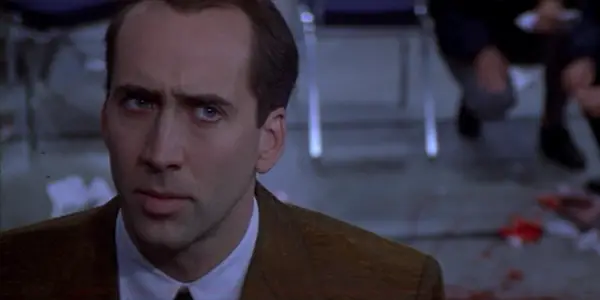
Whilst overall it’s a slightly messy film, Snake Eyes doesn’t deserve the negative critical responses it received at the time. Nicolas Cage is an actor who’s mainly identified by his over-the-top acting style that has popped up throughout his career, those films including Wicker Man, Vampire’s Kiss and DeadFall, which have all sadly overshadowed Cage’s great performances he’s delivered (when the material allows for it). In Snake Eyes, the famous long opening tracking shot (13 minutes) has Cage playing a very flamboyant exaggerated character, which exhibits his overt style of acting, but once the tracking shot is over and the plot kicks into gear, Cage sheds this acting style and goes into a much more nuanced regulated performance. During an important boxing match in Atlantic City, the Secretary of Defence is assassinated and it’s left up to Rick Santoro (Cage) to find out what happened and why.
The film is a taut, nicely paced neo-noir, as Cage’s investigation into one crime delves into something much deeper and places his character into a much bigger conspiracy, a staple of many noir films. Set entirely within the casino, the film has a slight claustrophobic feel which really ramps up the tension. The ending features remnants of a deleted alternative ending (which when you read it, is quite ridiculous) so the ending is slightly jumbled and rushed in it’s delivery but overall this is a film which doesn’t deserve it’s negative hype and is probably De Palma’s last great film.
6. Devil in a Blue Dress (1995, Carl Franklin)
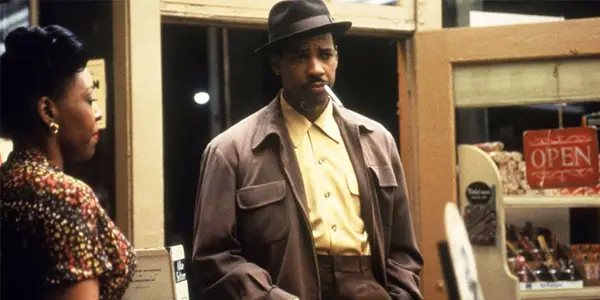
Made back in the 1990’s when Denzel Washington wasn’t making purely blockbuster action films, Devil In A Blue Dress is a great old school neo-noir set in the 1940’s. Based on Walter Mosely’s long series of noir novels, Devil In A Blue Dress tells the story of ‘Easy’ Rawlins, an unemployed WW2 veteran who decides to pick up a missing persons case in order to make some money. In true noir fashion, the case turns alot uglier and deeper than Easy could imagine, which forces him to have an old associate Mouse Alexander (Don Cheadle) to help him out, a man much scarier and evil than any antagonist Easy has to deal with.
Whilst Denzel is great in the film as Easy, the most memorable and scene-stealing actor in the film is Cheadle, who creates an exceptional character out of Mouse, an unpredictable force of nature that blasts through each of his selective scenes. The film borrows from alot of past noir titles, such as Chinatown and The Big Sleep, but manages to create it’s own identity, even though the plot may be a bit predictable once you catch onto what’s happening due to it’s reliance on past noir tropes. A film underseen by today’s audiences, it’s one that definetly worth checking out for any noir fans.
7. Hardcore (1979, Paul Schrader)
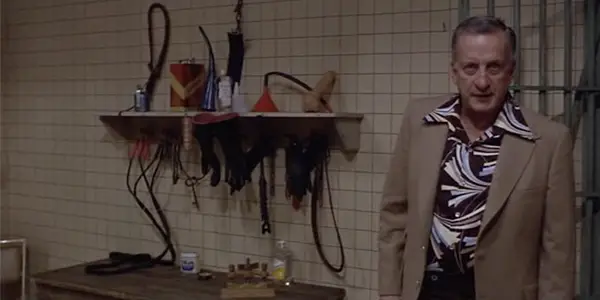
Paul Schrader, most famous for writing the screenplay for Taxi Driver, broke out into directing after it’s success, where he directed Blue Collar, a dramatic vehicle for Richard Pryor. Schrader has directed some great films throughout his career, even though lately his output has been quite lacking (the most famous example being the Lindsay Lohan disaster The Canyons). Hardcore is a great film, a sleazy neo-noir film which really revels in it’s sordid behaviour and atmosphere and works as a great material for George C. Scott. Hardcore is about Jack VanDorn (George C. Scott), a strict Catholic businessman that goes hunting for his missing daughter and discovering she has delved into the underground world of porn, which VanDorn must also slowly sink into to save his daughter.
This film is most famous now for a certain scene which has become a Youtube Meme, where early in the film VanDorn is shown a porn film in cinema where he slowly realises it involves his daughter, which leads to a chaotic meltdown by VanDorn to stop the film (it is usually paired with terrible things, such as the trailer for Adam Sandler’s Jack and Jill). The atmosphere in the film created by Schrader is trashy in the right way and whilst it kinda ends in a very 70’s action film way which seems out of place with the rest of the film, overall the film is a great piece of filmmaking and one of Schrader’s most underrated works.
Can you think of any more great Neo-Noir films that we missed out on?
(top image: Night Moves – source: Warner Bros.)
Does content like this matter to you?
Become a Member and support film journalism. Unlock access to all of Film Inquiry`s great articles. Join a community of like-minded readers who are passionate about cinema - get access to our private members Network, give back to independent filmmakers, and more.













